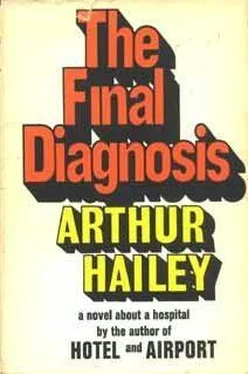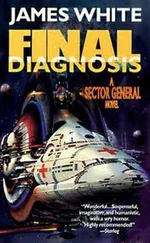Arthur Hailey - The Final Diagnosis
Здесь есть возможность читать онлайн «Arthur Hailey - The Final Diagnosis» весь текст электронной книги совершенно бесплатно (целиком полную версию без сокращений). В некоторых случаях можно слушать аудио, скачать через торрент в формате fb2 и присутствует краткое содержание. Жанр: Триллер, на английском языке. Описание произведения, (предисловие) а так же отзывы посетителей доступны на портале библиотеки ЛибКат.
- Название:The Final Diagnosis
- Автор:
- Жанр:
- Год:неизвестен
- ISBN:нет данных
- Рейтинг книги:4 / 5. Голосов: 1
-
Избранное:Добавить в избранное
- Отзывы:
-
Ваша оценка:
- 80
- 1
- 2
- 3
- 4
- 5
The Final Diagnosis: краткое содержание, описание и аннотация
Предлагаем к чтению аннотацию, описание, краткое содержание или предисловие (зависит от того, что написал сам автор книги «The Final Diagnosis»). Если вы не нашли необходимую информацию о книге — напишите в комментариях, мы постараемся отыскать её.
The Final Diagnosis — читать онлайн бесплатно полную книгу (весь текст) целиком
Ниже представлен текст книги, разбитый по страницам. Система сохранения места последней прочитанной страницы, позволяет с удобством читать онлайн бесплатно книгу «The Final Diagnosis», без необходимости каждый раз заново искать на чём Вы остановились. Поставьте закладку, и сможете в любой момент перейти на страницу, на которой закончили чтение.
Интервал:
Закладка:
Pearson was studying the slides again. He mumbled, as a lot of pathologists did when they were mentally crossing off some factors and confirming others. McNeil heard, “It’s a little small . . . absence of hemorrhage . . . no necrosis of the tissue . . . negative but no indication . . . yes, I’m satisfied.” Pearson straightened up from the microscope, replaced the last slide, and closed the slide folder. Motioning to the resident to write, he said, “Diagnosis—a blue nevus.” Courtesy of Pathology, the woman patient had been reprieved.
Methodically, for McNeil’s benefit, Pearson ran over the reasons for his decision again. As he passed the slide folder he added, “You’d better study these. It’s a specimen you won’t see often.”
McNeil had no doubt that the old man’s finding was right. This was one place where years of experience paid off, and he had come to respect Pearson’s judgment in matters of pathological anatomy. But when you’ve gone, he thought, looking at the old man, that’s when this place will need a cross file—badly.
They studied two more cases, both fairly straightforward, then Pearson slipped in the first slide from the next series. He took one look through the microscope eyepiece, straightened up, and told McNeil explosively, “Get Bannister!”
“I’m still here.” It was Bannister, calmly, behind them at the file cabinets.
Pearson wheeled. “Look at this!” He was using his loudest, hectoring voice. “How many times do I have to give instructions about the way I want slides made? What’s wrong with the technicians in Histology? Are they deaf or just plain stupid?”
McNeil had heard the same kind of outburst before. He sat back and watched as Bannister asked, “What’s the trouble?”
“I’ll tell you what’s the trouble.” Pearson ripped the slide from his microscope and tossed it across the table. “How can I give a proper diagnosis with this kind of tissue section?”
The senior lab technician picked up the slide and held it to the light. “Too thick, eh?”
“Of course it’s too thick.” Pearson picked out a second slide from the same set. “Look at this one. If I had some bread I could scrape off the meat and make a sandwich.”
Bannister grinned. “I’ll check the microtome. We’ve been having trouble with it.” He pointed to the slide folder. “Do you want me to take these away?”
“No. I’ll have to make do with them.” The explosiveness had gone now; the old man was merely growling. “Just do a better job in supervising Histology.”
Bannister, disagreeable himself by this time, grumbled on his way to the door. “Maybe if I didn’t have so much else . . .”
Pearson shouted after him, “All right. I’ve heard that record before.”
As Bannister reached the door, there was a light tap and Dr. Charles Dornberger appeared. He asked, “May I come in, Joe?”
“Sure.” Pearson grinned. “You might even learn something, Charlie.”
The obstetrician nodded pleasantly to McNeil, then said casually to Pearson, “This was the morning I arranged to come down. Had you forgotten?”
“Yes, I had.” Pearson pushed the slide folder away from him. He asked the resident, “How many more in this batch?”
McNeil counted the slide folders remaining. “Eight.”
“We’ll finish later.”
The resident began to gather up the case papers already completed.
Dornberger took out his pipe and leisurely filled it. Looking around the big drab room, he shivered. He said, “This place feels damp, Joe. Every time I come here I feel like I’m going to get a chill.”
Pearson gave a deep chuckle. He said, “We spray flu germs around—every morning. It discourages visitors.” He watched McNeil cross the room and go out of the door. Then he asked, “What’s on your mind?”
Dornberger wasted no time. He said, “I’m a deputation. I’m supposed to handle you tactfully.” He put the pipe in his mouth, his tobacco pouch away.
Pearson looked up. “What is this? More trouble?”
Their eyes met. Dornberger said quietly, “That depends.” After a pause he added, “But it looks as if you may get a new assistant pathologist.”
Dornberger had expected an outburst, but Pearson was strangely quiet. He said thoughtfully, “Whether I want one or not, eh?”
“Yes, Joe.” Dornberger made it definite; there was no point in holding back. He had thought a good deal about this since the meeting of several days ago.
“I suppose O’Donnell is back of this.” Pearson said it with a touch of bitterness but still quietly. As always, he was being unpredictable.
Dornberger answered, “Partly but not entirely.”
Again surprisingly, “What do you think I should do?” It was a question asked by one friend of another.
Dornberger laid his pipe, unlighted, in an ash tray on Pearson’s desk. He was thinking: I’m glad he’s taking it this way. It means I was right. I can help him accept this, adjust to it. Aloud he said, “I don’t believe you’ve much choice, Joe. You are behind with surgical reports, aren’t you? And a few other things?”
For a moment he thought he had gone too far. This was a sensitive area. He saw the other man brace up and waited for the storm to break. But again it did not. Instead, more strongly than before, but reasonably, Pearson said, “Sure, a few things need straightening out. I’ll admit that to you. But there’s nothing I can’t handle myself—if I can just get the time to do it.”
He has accepted it, Dornberger thought. He’s sounding off now. But he has accepted it just the same. He said casually, “Well, maybe you’ll get the time—with another pathologist.” With equal casualness he pulled from his inside pocket the paper which the administrator had given him.
Pearson asked, “What’s that?”
“There’s nothing definite about this, Joe. It’s a name that Harry Tomaselli had—apparently some young fellow who might be interested in coming here.”
Pearson took the single sheet. He said, “They sure didn’t waste any time.”
Dornberger said lightly, “Our administrator is a man of action.”
Pearson was scanning the paper. He read aloud, “Dr. David Coleman.” There was a pause. Then with bitterness, frustration, and envy the old man added, “Age thirty-one.”
It was twenty minutes after midday, and the hospital cafeteria was at its busiest. Most of the doctors, nurses, and hospital employees usually took their lunch about this time, and a line-up was beginning to form at the point where newcomers collected trays before passing counters and steam tables where the food was served.
Mrs. Straughan, as usual at this period, had her eye on proceedings, ensuring that as fast as one batch of food was used up another was brought from the kitchens to keep the line out front moving briskly. Today there was a choice of Irish stew, lamb chops, and broiled halibut. The chief dietitian noticed that the lamb chops were moving slowly. She decided to try some herself in a few minutes to see if there were any reason. Perhaps the meat was not as succulent as it might be; word of something like that was often passed to those arriving in the cafeteria by others who were leaving. Mrs. Straughan noticed a dish at the top of a pile on the servery that appeared to have a mark on it. She stepped forward and removed it quickly; sure enough, it still bore traces of an earlier meal. The dishwashing machines again! she thought. Their inadequacy was a recurring problem, and she decided to broach the subject with the administrator again very soon.
Over at the tables reserved for the medical staff there was the sound of noisy laughter. It came from a group of which Dr. Ralph Bell, the radiologist, was the center.
Gil Bartlett, who had come from the serving counter with a tray, put it down and went over with extended hand. “Congratulations, Ding Dong,” he said. “I just heard.”
Читать дальшеИнтервал:
Закладка:
Похожие книги на «The Final Diagnosis»
Представляем Вашему вниманию похожие книги на «The Final Diagnosis» списком для выбора. Мы отобрали схожую по названию и смыслу литературу в надежде предоставить читателям больше вариантов отыскать новые, интересные, ещё непрочитанные произведения.
Обсуждение, отзывы о книге «The Final Diagnosis» и просто собственные мнения читателей. Оставьте ваши комментарии, напишите, что Вы думаете о произведении, его смысле или главных героях. Укажите что конкретно понравилось, а что нет, и почему Вы так считаете.












